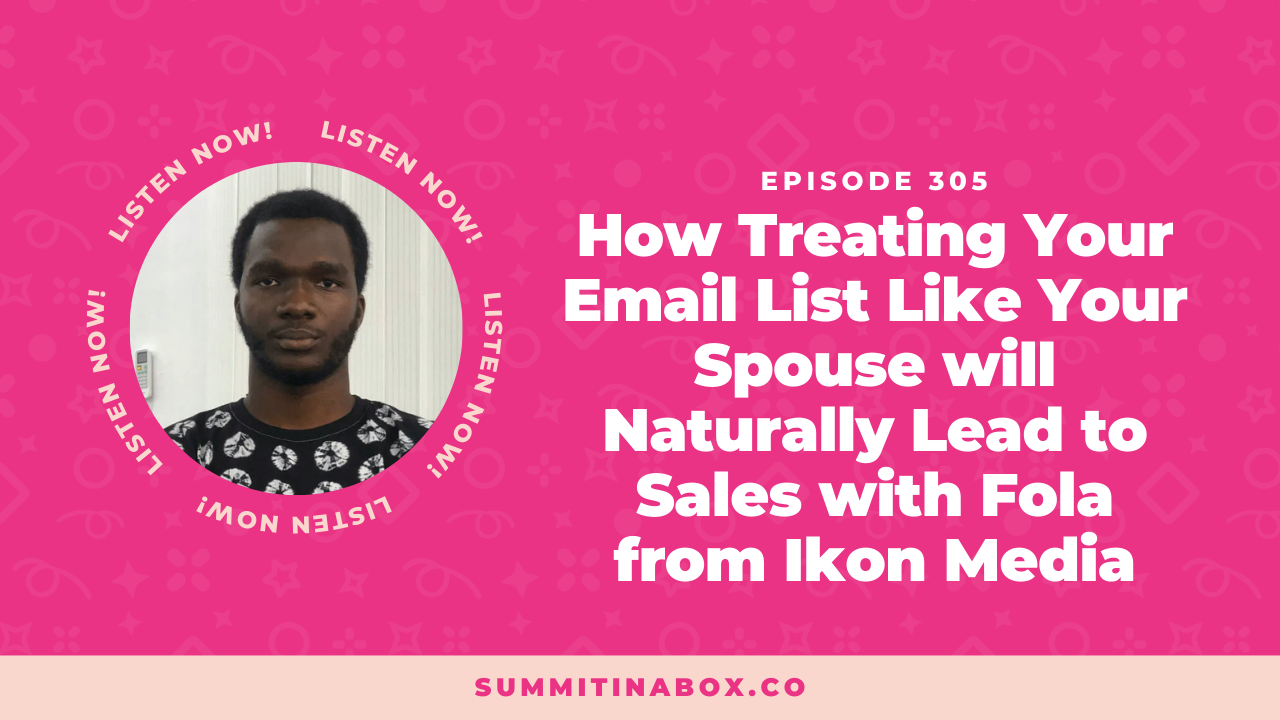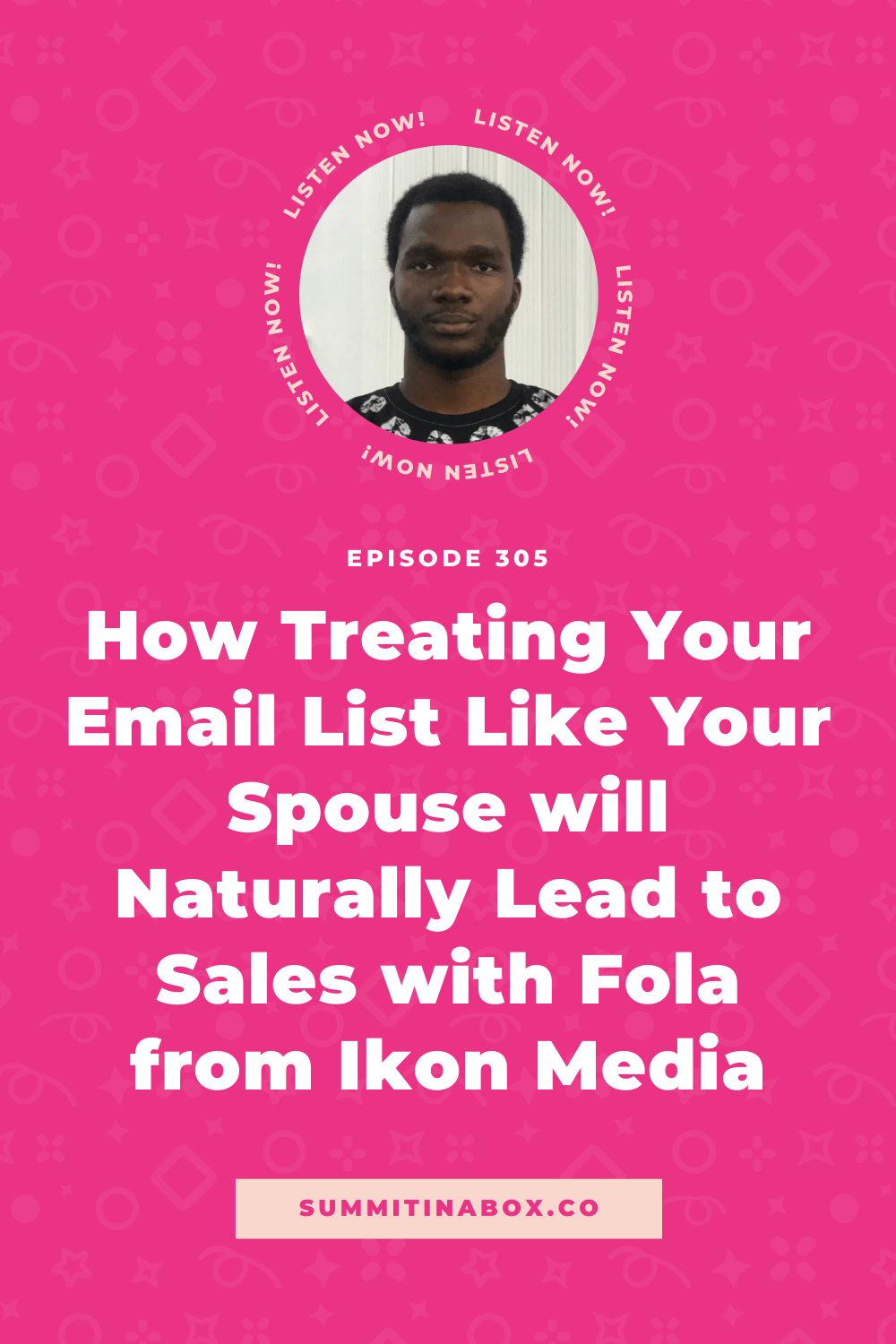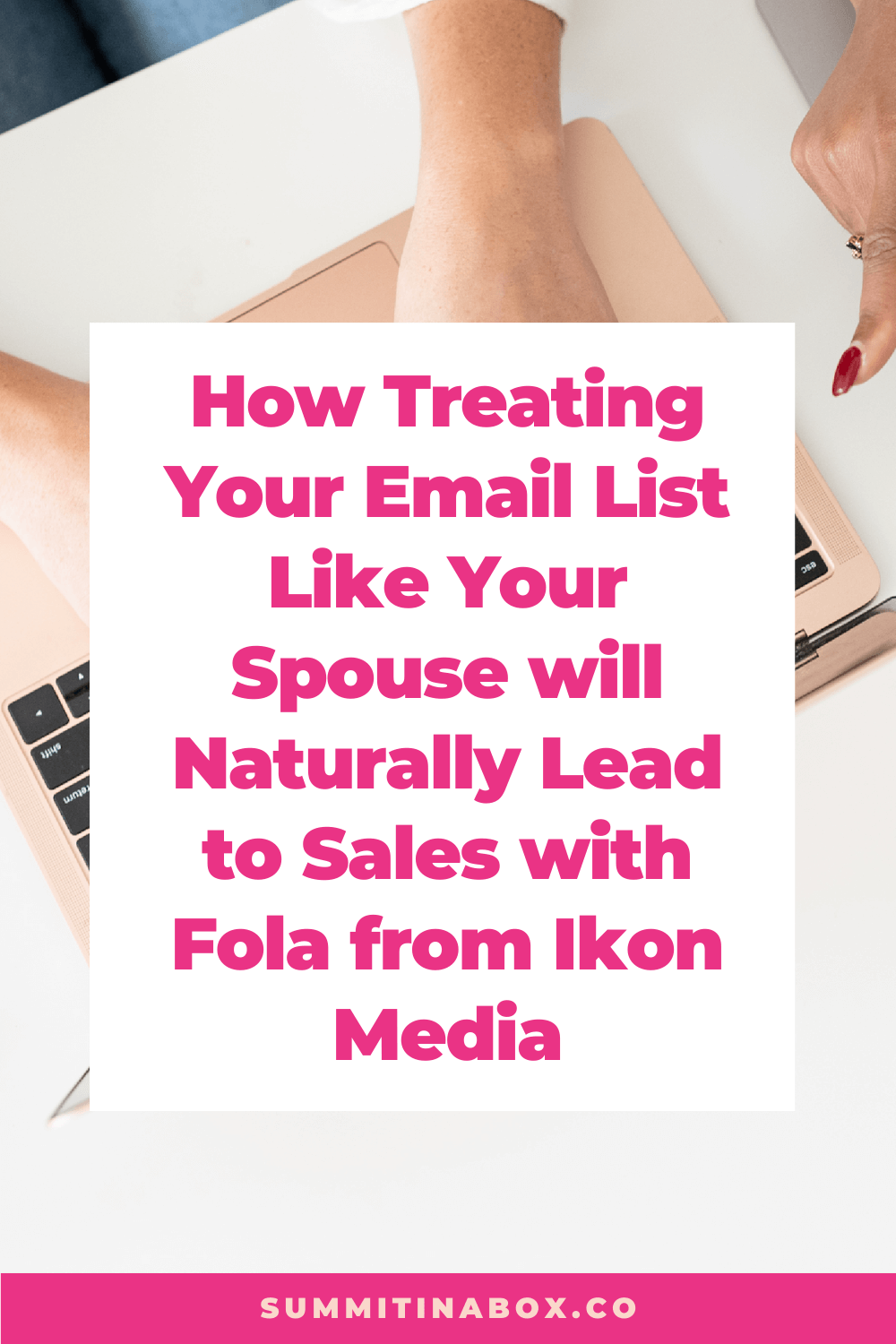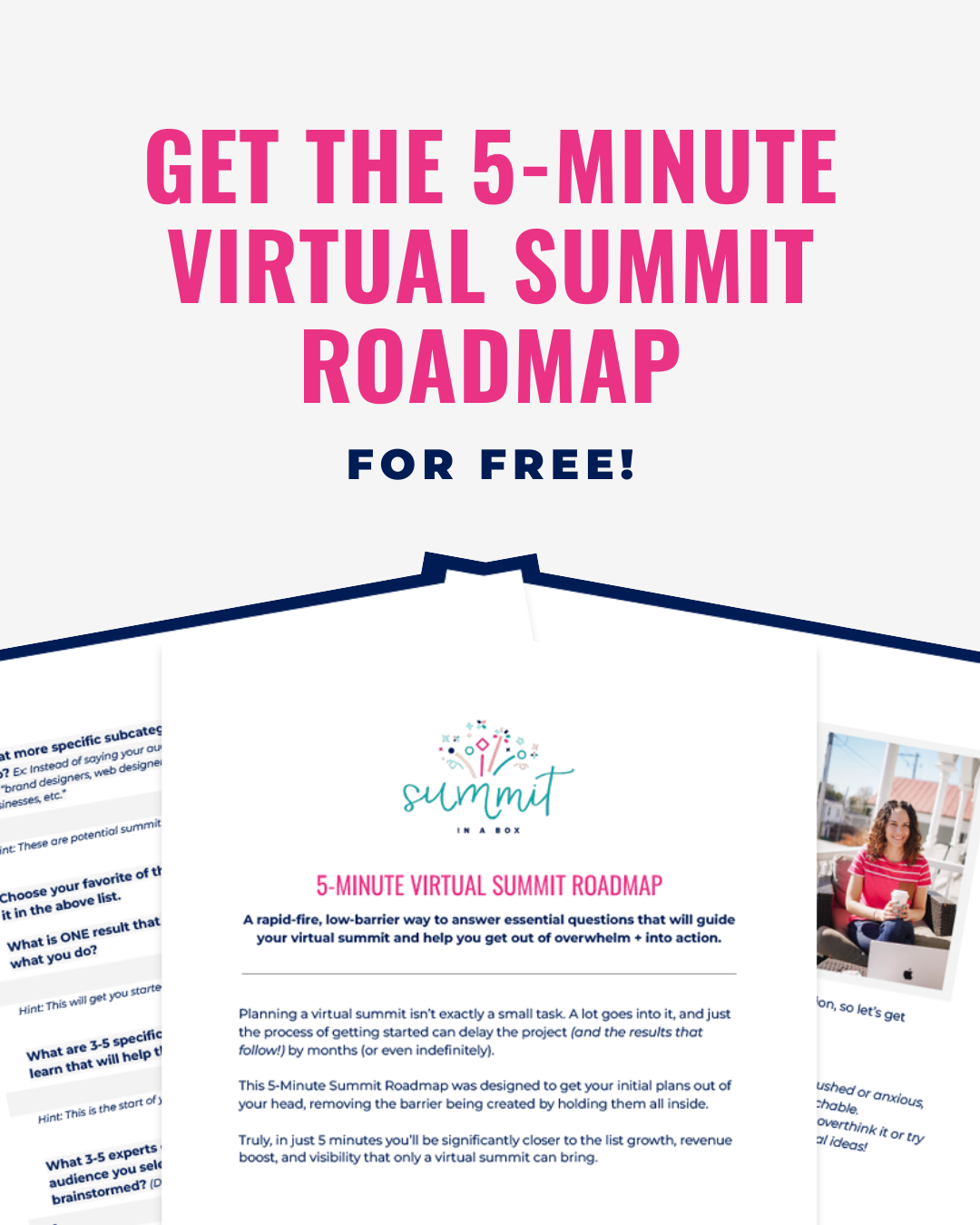How Treating Your Email List Like Your Spouse will Naturally Lead to Sales with Fola from Ikon Media


When I hosted Sell with a Summit: B2C Edition, I had someone inquire about sponsoring who I wasn't familiar with. So I started poking around his website to make sure I liked what I saw, and I found an approach to email marketing that I truly think we need more of in this space.
Today's episode is all about email marketing, and what you'll learn will carry over into every email you write moving forward, including your summit emails. My guest has a refreshingly honest approach to email marketing that challenges the norm by treating email as its own unique medium – not just another social or sales channel.
He's passionate about showing entrepreneurs how they're leaving money on the table with conventional email strategies, and I'm excited to dive into his unique perspective that will transform how you think about every email you send.
Listen to the episode
Prefer to listen to this post instead? Use the links below to listen on your preferred podcast player:
Download the episode transcript here.
Episode at a glance:
[01:40] Fola runs Ikon Media, an email marketing and website development agency, but he's really passionate about the email marketing side. He got his start in web design and development after creating software for educational institutions and discovering he didn't know anything about marketing and sales. That threw him down the rabbit hole of learning how to get customers, which eventually led to starting his own marketing agency.
"We help business owners, really, of of any kind, provided you sell something that improves the lives of others, to write emails and plan around email marketing that is effective and enjoyable. We focus on making it both fun for you as the business owner, but also very fun for your readers to read and buy from."
[03:30] Fola explains his unique approach to email marketing as "a cross breed of social media and phone selling with a mix of stand up comedy and regular conversation." The biggest misconception is that people try to take email for what it isn't – some see it as a sales call where you have to handle objections and pitch hard, but that's not really what it is.
"The best stand up comedy is being conversational, then surprising your audience with something they weren't thinking, allowing them to enjoy the moment, which is what your email should do. Email marketing is basically a means of conversation with your lists on a day to day basis. A lot of my strategies are built around the relationship side of things, because if that is done, then the sales take care of themselves."
[05:39] Fola really emphasizes the importance of relationship in email marketing, with the idea of treating your email list like your wife. Just like you're more likely to buy cookies from a neighbor you've known for 20 years over someone who cold-called you, people buy from those they have relationships with. While most people focus on subject line tricks or body copy tactics in their email marketing strategies, it's a lot more effective to focus instead on building the relationship first.
"The whole concept of treating your email list like your wife is that you need to have respect for your list just like you would have for someone you're in a relationship with, and the same way you treat someone you're in a relationship with should be the way you treat your list, because if you can build a strong relationship with them, you'll find out that you don't need to do any high pressure sales tactics."
[09:20] When it comes to email frequency, Fola generally recommends daily emails, but there can be some nuance to that, and many people are used to sending emails much less often than that. Rather than jumping from emailing once a week or less to daily emails, Fola recommends gradually increasing frequency. The mindset shift is understanding that if you're married to someone, you'd want to speak to them every day. From a business perspective, if someone is on 10 lists of cookie sellers and one person emails daily while another emails weekly, whose name will they remember when they need cookies?
"We project our fears onto our audience. Because we feel like if someone sends us an email every day, we would not like it, so we believe our audience also would not like it. What you love is totally different from what your audience loves. You don't want to sabotage your business because you are projecting your fears onto your audience."
[14:35] Even if you love the idea of emailing your list more frequently to build relationships, you might still have concerns about the time commitment for writing and sending daily emails. It's really all about priorities. Fola gives the example of having a machine that would produce $20,000 a day, just for staring at it for an hour. You would find an hour a day to do that. The problem is people don't see email as something that should be prioritized because they're not seeing results. But with the right approach, you can not only make your emails more effective, so they bring more results, but also make them quicker to write too.
"Email doesn't have to take a long time to be effective. For example, one type of email I teach is called a personal experience email. At the end of this podcast, I could write an email to my list, saying, 'Hi guys, I did a podcast with Krista that was amazing. We spoke about everything email and summits, and I had the time of my life. One of the things I learned was how Krista went from one email a week to four emails a week, and her business has grown better than before. That affirmed why increasing email frequency is the way to go if you want to learn more about my methodologies of writing email, click the link below and check out this product.' That is an email I could write in one minute. I'm talking from my personal experience and telling my list about that. That is the easiest email, if you don't have a lot of time. You could bash it out in five minutes, and you're good to go."
[18:33] Rather than relying on email templates, Fola recommends thinking of emails as conversations with friends – you don't plan out every minute of a conversation, you just freestyle it. But you can have some structure to guide your emails. His favorite structure is: curiosity-driven subject line, story (either personal experience or someone else's experience), bridge, then offer. Another approach is list-based emails with multiple points that naturally lead to an invitation to learn more.
"Don't put so much pressure on yourself. Just be free. Be very human. Some of the best emails I've written were just stream of consciousness, just talking like I would talk to a friend."
[24:35] Fola's email strategies work for emailing your list at any time, but for summits specifically, he recommends increasing email frequency during promotional periods. During registration, send multiple emails per day and consider offering bonuses for early registration to prevent procrastination. After the summit, treat your paid offer as a launch with a clear beginning and end – starting with two emails on day one and building up to five emails on the final day.
"No matter what you are selling, it's pretty much the same thing. The general idea of an email that will sell a product is the same general idea of an email that will sell a summit or an event or a service. If you have the idea that your email list is your wife going into that, everything kind of builds upon itself."
About Fola
 Fola is a seasoned copywriter and marketer and is the founder of IKON Media, a marketing agency specializing in email marketing and website development for small business owners. Under his leadership, IKON Media has helped design and develop professional websites for clients in several industries such as real estate, education, agriculture, etc and has also helped increase revenue for clients across industries like health and wellness, online marketing, beauty, etc. Author of three books and trainings on email marketing, Fola’s mission is to empower entrepreneurs to build thriving businesses without sacrificing what truly matters - health, family, life and love.
Fola is a seasoned copywriter and marketer and is the founder of IKON Media, a marketing agency specializing in email marketing and website development for small business owners. Under his leadership, IKON Media has helped design and develop professional websites for clients in several industries such as real estate, education, agriculture, etc and has also helped increase revenue for clients across industries like health and wellness, online marketing, beauty, etc. Author of three books and trainings on email marketing, Fola’s mission is to empower entrepreneurs to build thriving businesses without sacrificing what truly matters - health, family, life and love.
Ikon Media | $57K Case Study | Email Fast Track
Resources
- Episode 222: Build Excitement and Anticipation for Your Next Launch with Brenna McGowan
- Episode 297: The Keys to Emails that Increase Summit Registrations with Allison Hardy
- Summit Host Hangout® Facebook group
- Launch with a Summit Accelerator®
- 6-Figure Summits Workshop Bundle
Pin it for later!



5-Minute Virtual Summit Roadmap
The 5-Minute Summit Roadmap leads you through the 7 essential questions that will guide the rest of your summit planning process and help you finally start making meaningful progress toward a profitable event.

